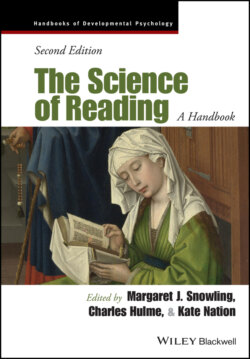Читать книгу The Science of Reading - Группа авторов - Страница 30
Disruptions in the reading comprehension system.
ОглавлениеText comprehension sometimes fails. Disruptions in comprehension can arise from processes within the comprehension system (see Figure 1.3) and the linguistic and conceptual knowledge systems (Figure 1.1) they depend on. Pressure points within the comprehension system emerge with specific demands. For example, syntactic complexity and ambiguity threaten sentence comprehension; a failure to make a required inference threatens sentence comprehension and text coherence; and a text requiring conceptual knowledge not accessible to the reader threatens global text comprehension. However, the disruptions are not so conveniently localized as these observations imply. Disruptions to word‐identification processes do not end there, but can spread to result in disruptions to sentence and global text comprehension. The lexicon is a particularly important pressure point in the system, sending its output – multiple levels of information about the word being read (context‐relevant meaning and form class, potential for argument role filling and for referential specification, and more) – to the comprehension system. A disruption at this point has consequences “downstream.” This much is a description of what can go wrong for any reader for a specific text. A skilled reader can repair comprehension failures.
The research field, however, has been concerned with individual differences in comprehension failures – “poor comprehenders” (e.g., Cain & Oakhill, 2007; Hulme & Snowling, 2011; Oakhill & Yuill, 1996). Rather than address them here, we instead emphasize that, aside from language impairments – which can affect multiple linguistic knowledge sources and processes – the ordinary range of reading skill does not include individuals who have dysfunctional processing subsystems of comprehension. Rather than faulty processes such as inference making or a lack of comprehension monitoring, activating relevant knowledge may be the main issue. Knowledge of word forms (orthography), word meanings (vocabulary knowledge), knowledge of language machinery (syntax, morphology), and conceptual knowledge combine to support successful comprehension. Readers for whom the word‐identification system works efficiently, but nevertheless consistently fail in comprehension may lack sufficient critical knowledge or fail to have the knowledge activated strongly or quickly enough to engage in inference making and comprehension monitoring when reading the text (Nation, 2005). One of the points of progress in the study of individual differences has been an increased recognition of the need to assess reading components (fluent word identification, vocabulary, relevant knowledge) in order to identify some other targeted components of the reading comprehension system (see Cain, this volume).
